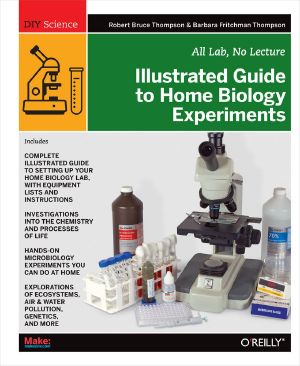Illustrated Guide to Home Biology Experiments · All Lab, No Lecture

- Authors
- Thompson, Robert Bruce & Thompson, Barbara Fritchman
- Publisher
- Maker Media, Inc
- Tags
- science , reference , life sciences , biology
- ISBN
- 9781449396596
- Date
- 2012-04-26T00:00:00+00:00
- Size
- 9.17 MB
- Lang
- en
Experience the magic of biology in your own home lab. This hands-on introduction includes more than 30 educational (and fun) experiments that help you explore this fascinating field on your own. Perfect for middle- and high-school students and DIY enthusiasts, this full-color guide teaches you the basics of biology lab work and shows you how to set up a safe lab at home.
The *Illustrated Guide to Home Biology Experiments* is also written with the needs of homeschoolers firmly in mind, as well as adults who are eager to explore the science of nature as a life-long hobby. To get the most from the experiments, we recommend using this guide in conjunction with a standard biology text, such as the freely downloadable *CK-12 Biology* (ck-12.org).
Master the use of the microscope, including sectioning and staining
Build and observe microcosms, soda-bottle worlds of pond life
Investigate the chemistry of life from simple acids, bases, and buffers to complex carbohydrates, proteins, lipids, enzymes, and DNA
Extract, isolate, and observe DNA
Explore photosynthesis, osmosis, nitrogen fixation, and other life processes
Investigate the cell cycle (mitosis and cytokinesis)
Observe populations and ecosystems, and perform air and water pollution tests
Investigate genetics and inheritance
Do hands-on microbiology, from simple culturing to micro-evolution of bacteria by forced selection
Gain hands-on lab experience to prepare for the AP Biology exam
Through their company, The Home Scientist, LLC ([thehomescientist.com/biology](http://thehomescientist.com/biology)), the authors also offer inexpensive custom kits that provide specialized equipment and supplies you’ll need to complete the experiments. Add a microscope and some common household items and you’re good to go.